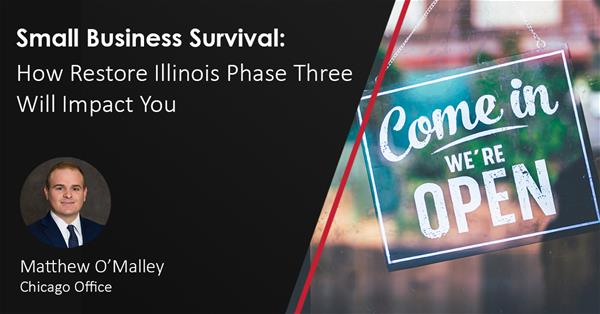
Illinois Governor J.B. Pritzker recently introduced important updates to the Restore Illinois reopening plan for the state. The phased plan is focused on safely reopening Illinois, and the anticipated shifts from Phase Two to Phase Three in many regions are indicative of the progress our state has made in flattening the curve. You can view your area's status on the Restore Illinois Regional Dashboard.
Phase Three of the Restore Illinois plan signifies recovery. This phase loosens some restrictions on individual behavior and expands the types of small businesses that can safely reopen. The State of Illinois defines Phase Three as "The rate of infection among those surveillance tested is stable or declining. COVID-19-related hospitalizations and ICU capacity remains stable or is decreasing. Face coverings in public continue to be required. Gatherings of 10 people or fewer for any reason can resume. Select industries can begin returning to workplaces with social distancing and sanitization practices in place. Retail establishments reopen with limited capacity, and select categories of personal care establishments can also begin to reopen with social distancing guidelines and personal protective equipment." Click here to view the Restore Illinois Phase Three webpage.
It is important to note that this does not change the fact that individuals need to practice social distancing, hygienic practices and overall common sense. Residents will still be required to wear a face covering or mask in public situations where they are not unable to maintain a distance of six feet from others. The face covering can be as simple as a cloth scarf and the exception is for anyone under the age of two.
Here are the highlights of some of the changes governing small businesses and a safe reopening of enterprise during Phase Three:
- Health care: All health care providers are open with Illinois Department of Public Health (“IDPH”) approved safety guidance;
- Education and child care: Remote learning in P-12 schools and higher education; Limited child care and summer programs open with IDPH approved safety guidance;
- Outdoor recreation: State parks open; Activities permitted in groups of 10 or fewer with social distancing;
- Manufacturing: Non-essential manufacturing that can safely operate with social distancing can reopen with IDPH approved safety guidance;
- “Non-essential” businesses: Employees of “non-essential” businesses are allowed to return to work with IDPH approved safety guidance depending upon risk level, remote work strongly encouraged wherever possible; Employers are encouraged to provide accommodations for COVID-19-vulnerable employees;
- Bars and restaurants: They can continue to be open for delivery, pickup, drive through; also, outdoor seating areas are now allowed for dine-in service; however, tables need to be six feet apart from one another and from sidewalks, masks and distancing measures for staff and other precautions need to be taken;
- While it is not clear yet, there is discussion that some street areas will be closed to allow for increased outdoor dining space and pedestrian area in some municipalities;
- While it is not clear yet, there is discussion that some street areas will be closed to allow for increased outdoor dining space and pedestrian area in some municipalities;
- Personal care services and health clubs: Barbershops and salons open with IDPH approved safety guidance; Health and fitness clubs can provide outdoor classes and one-on-one personal training with IDPH approved safety guidance;
- Retail: Open with capacity limits and IDPH approved safety guidance, including face coverings;
- Boating and Camping: Campgrounds will be allowed to open, with proper social distancing procedures in place; groups of 10 or fewer people will also be allowed to travel together on boats, but must continue to wear masks when social distancing is not possible;
- Golf courses: Golfers will now be allowed to play in groups of up to four. Carts will also be allowed, but will still only be allowed to transport one golfer, unless the two golfers have been living together during the stay-at-home order; in addition, driving ranges will be allowed to reopen; and,
- Other outdoor recreation: Shooting ranges and paintball courses will also be allowed to reopen, with guidelines in place.
It is important to be cognizant of these laws to ensure protection against liability. We are ready to assist you during this difficult time. Tressler recognizes that each business will have diverse needs, and we are available to help you develop a plan or policy, implement rules or a waiver, evaluate your business records and otherwise assist you in responsibly and legally getting your business back up and running. Only through proactive planning and careful execution will your business mitigate the impact of COVID-19.
Feel free to contact me for a complimentary consultation at momalley@tresslerllp.com or by phone at (312) 627-4052.
About Matthew J. O’Malley
Matt is a member of Tressler's Litigation Practice Group and advises his clients on litigation strategies, skillfully representing them through all phases of litigation. Matt has a track record of success in both bench and jury trials. He focuses on the client’s resolution goals, whether that is achieved through trial, settlement conference, mediation or arbitration. Matt serves his clients in a variety of complex litigated and non-litigated matters, including actions for breach of contract, breach of fiduciary duty, indemnity and contribution, professional malpractice, personal injury, general corporate, LGBT issues, employment discrimination and civil rights violations.
About Tressler LLP
Tressler LLP is a national law firm headquartered in Chicago, with eight offices located in five states - California, Illinois, New Jersey, New York and Pennsylvania. Tressler attorneys are experienced counselors and advocates who appear in state and federal courts, and in governmental proceedings, throughout the United States. Many Tressler attorneys devote their practice to the representation of the insurance industry in coverage analysis and resolution, litigation, underwriting consultation, product development, claims management and reinsurance. Tressler attorneys also represent clients in commercial litigation, employment, local government law, corporate transactions and intellectual property law. Contact us to learn more. Contact us to learn more.

